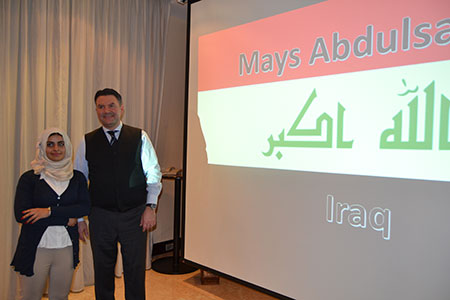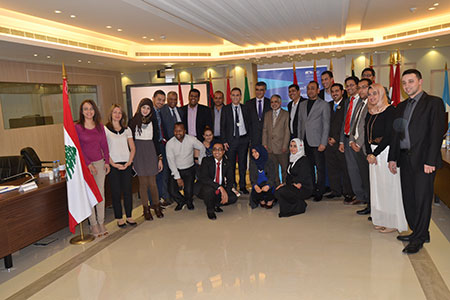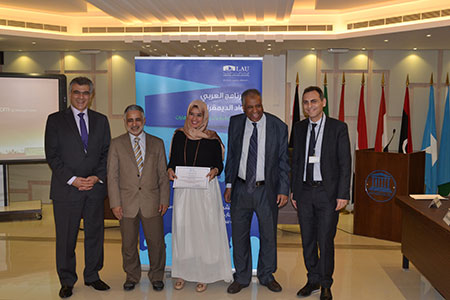- English
- عربي
News and Events
Week 4 Report
Fourth Week Report on Leaders for Democracy program 2015
by Baghdad Al-Kadri
The fourth week was the last stage in the academic section in the Leaders For Democracy (LDF) program during which the basic rules and concepts that must the characteristics of a true pioneer and leader were defined and set; by way of skillful use of the art of public speech and of image projecting and media management, or through the strengthening of the concept of intercultural dialog and respect of differences, all of which constitute the basic elements of democratic leaders.
The Leaders For Democracy pursued their training for the fourth consecutive week and were joined by Dr. Majed Bou Hadir on Monday, March 16th who conducted a lecture and workshop in the art of public speech and interactive media that witnessed active interaction on the part of the participants. Dr. Bou Hadir managed several exercises related to the preparation and delivery of speech and to the skills needed for television broadcasting that were satisfactory to the participants given the skills that were acquired.
 On the next day of training, UNESCO hosted the leaders at its Beirut headquarters to an inten- sive workshop promoting intercultural dialog and peace. The three-day workshop is part of King Abdullah bin Abdulaziz International Programme for a Culture of Peace and Dialogue. The workshop held on March 18 ,17 and 19 of 2015 acquainted the leaders with the concepts and approaches to intercultural dialog.
On the next day of training, UNESCO hosted the leaders at its Beirut headquarters to an inten- sive workshop promoting intercultural dialog and peace. The three-day workshop is part of King Abdullah bin Abdulaziz International Programme for a Culture of Peace and Dialogue. The workshop held on March 18 ,17 and 19 of 2015 acquainted the leaders with the concepts and approaches to intercultural dialog.
 The aim of the workshop is to ensure the easy and flexible evolvement of participants into a culturally diverse environment that is full of challenges and to equip them with technical capabilities and strategic skills enabling the new generation to make a bigger impact in view of their active role in civil society. The seminar, managed by UNESCO consultant and former Lebanese minister for social affairs Dr. Salim Al-Sayegh was focused on the development of communication and dialog skills of the participants; building their capacities in critical inquiry, problem setting and providing suitable solutions; provides them with a practical approach based on their views and experiences so that they can employ their acquired capabilities in realistic and physical situations that they may encounter in their daily lives.
The aim of the workshop is to ensure the easy and flexible evolvement of participants into a culturally diverse environment that is full of challenges and to equip them with technical capabilities and strategic skills enabling the new generation to make a bigger impact in view of their active role in civil society. The seminar, managed by UNESCO consultant and former Lebanese minister for social affairs Dr. Salim Al-Sayegh was focused on the development of communication and dialog skills of the participants; building their capacities in critical inquiry, problem setting and providing suitable solutions; provides them with a practical approach based on their views and experiences so that they can employ their acquired capabilities in realistic and physical situations that they may encounter in their daily lives.
 The seminar was concluded with a reception attended by UNESCO Regional Director, Hamed Al Hammami who delivered a welcome speech to the participants emphasizing the importance of taking their experience back home and applying the concept of dialog and teamwork to help the Arab nation overcome its current state of conflict. Dr. Al Hammami along with the educa- tion program specialist at UNESCO, Dr. Higazi, the Leaders For Democracy program coordinator Mr. Imad Salamey and lecturer, Dr. Salim Al-Sayegh handed diplomas to the trainees for their participation in the workshop. In return, the trainees expressed their deep gratitude to UNESCO given the significance and importance of the training program.
The seminar was concluded with a reception attended by UNESCO Regional Director, Hamed Al Hammami who delivered a welcome speech to the participants emphasizing the importance of taking their experience back home and applying the concept of dialog and teamwork to help the Arab nation overcome its current state of conflict. Dr. Al Hammami along with the educa- tion program specialist at UNESCO, Dr. Higazi, the Leaders For Democracy program coordinator Mr. Imad Salamey and lecturer, Dr. Salim Al-Sayegh handed diplomas to the trainees for their participation in the workshop. In return, the trainees expressed their deep gratitude to UNESCO given the significance and importance of the training program.
Friday, March 20th was set for the trainees to meet their counselors during the training period at Crown Plaza Hotel in Hamra where they all spent time together and the trainees were given instructions on the content of their work and responsibilities and were provided with all neces- sary logistical information prior to the launch of the training period. At two in the afternoon, the head of political and economic section at the US Embassy in Beirut, Mr. Rice Smith met the leaders at the hotel in the framework of the American Policy. A number of constructive discus- sions took place regarding the situation in the Middle East including the latest on the crises and calamities gripping the Arab nation and attempts to resolve them. Mr. Smith discussed Ameri- can policies and the strategic vision for the current conflicts in Iraq and Syria that are battling against Islamic State in Iraq and Syria (ISIS). The leaders discussed with Mr. Smith the priorities of the United States in the Middle East in the near future and ways for application thereof. The same day, the Middle East Partnership Initiative (MEPI) coordinator in Lebanon, Mr. Eric Ryan joined the group and spoke about the development mission of MEPI and the organization’s humanitarian goals as well as the reform purposes of its projects. He also discussed the ways to prepare and draft the content of projects and ways of securing funding for these projects.
At the end of the fourth week, the leaders met MEPI’s alumni on Saturday and the members of Middle East Partnership Initiative – Lebanon Alumni Association (MEPI LAA) at which time, the Association President, attorney Youssef Sfeir gave a speech explaining the mission of the association, its humanitarian and developmental message while detailing the projects and highlighting the association’s achievements during the past period. Ms. Sylva Akl detailed the projects of MEPI LAA. In conclusion, Dr. Said Issa discussed the importance of solidarity and interdependence in order to make the work of civil societies successful. After lunch that gathered all the participants of the day, Mr. Walid Touma, program manager of Leaders For Democracy, made his closing and motivating remarks to the trainees addressing the impor- tance of the program, their significant role as leaders and makers of democracy in the Arab world at time when what is most neededs to exit the current period of crises is democracy which is the way and means to truly achieve reform.
